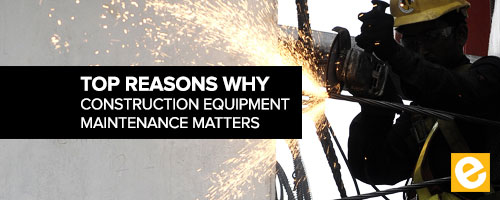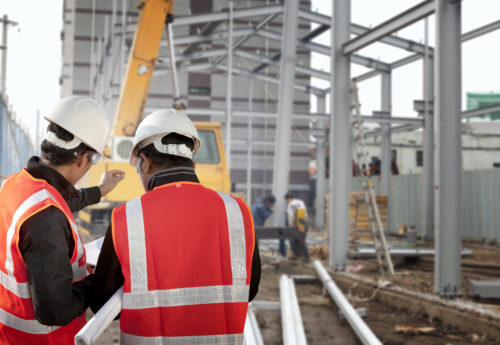
Top 7 Reasons Why Construction Equipment Maintenance Matters
Construction equipment maintenance contributes to about 40% of total construction project overrun costs, according to a study in the International Journal of Engineering Science Invention. In addition, failing to keep up with your preventative maintenance has a significant ripple effect on greater projects. This can stall your progression, cause you to miss key due dates, which, in turn, leads to lower profits for your construction business. Spending a little more time planning out preventative maintenance of mechanical equipment can pay dividends for your overall operation. Here are some concrete examples of how this plays out.
Table of Contents
The Key Reasons For Mechanical Equipment Maintenance
1. Saves You Money Long-Term
Sure, getting regular equipment maintenance represents an investment. This can seem doubly frustrating if you have your equipment looked at only to find out that it’s perfectly functional. However, you need to take a long-term point of view here. When you invest in the maintenance of mechanical equipment, it’s not about managing a major issue each time. Instead, you’re paying professionals to catch the smaller issues, do standard procedures, and replace certain parts before larger ones arise. This not only means you don’t have to pay for these massive repair jobs, but you don’t need to pay premiums for emergency services. If you compare a span of years of preventative maintenance vs. reactive repair, the maintenance method will save you money in the long run.

2. Safety
Statistically speaking, millions of dollars are awarded in lawsuits every year regarding personnel injured on construction sites. While you can’t necessarily foresee every circumstance, you should be working towards minimizing risks of accidents, and maintenance is a major part of that. As mentioned before, the more regularly your equipment is inspected and tuned, the less likely it is to fail or not work properly. Combined with best practices, this means a lower risk overall of injury. A safe job site is a more profitable one, not just due to legal costs and compensation, but also due to the lower amount of set-back days.
3. Saves You Time
Whether you get construction equipment maintenance done or not, repairs and upkeep are going to leave your pieces of equipment out of the rotation. However, would you rather have it out of operation for a few hours at a time of your choosing, or potentially for days or even weeks at a time? By doing regular maintenance of your mechanical equipment, you can cycle out your equipment for service, so operations are always up and running at some level on your job site. To be fair, creating this schedule can be daunting if you have a lot of equipment. This is why we recommend looking into construction management software to create a comprehensive schedule so that preventative maintenance doesn’t hold up a project. By keeping up with regular maintenance, you won’t have out-of-service equipment for days or more, just a short period of the designated time.

4. Efficiency
Operational efficiency is something that everyone should be focusing on at their construction site. This increases the return on investment for every action your company takes, and by proxy, it means more profit. Luckily, keeping up with construction equipment maintenance fits neatly into this mindset. Because preventative maintenance of mechanical equipment checks for wear and damage, it helps keep all the parts working efficiently. Preventative maintenance also checks alignments and other issues for users to get the most out of their machines. This leads to greater efficiency on the job site because not only is equipment functional, but it’s running at its optimum performance. You’ll also see better safety because there’s a lower risk of failure, but also a lower temptation for your team to try and adjust things on their own to have it work better. In addition, you don’t have to worry about missing deadlines because a piece of equipment is working slower or less effectively than you assumed.
5. Records, Accreditation, and Insurance
Regularly maintained equipment is often a condition for certain trade organizations and other accreditations your business can get. In order to keep accreditations current, it’s important to keep all construction equipment maintenance up-to-date. This matters for insurance also. The payout for some policies is contingent on your company keeping all relevant equipment maintenance up to date. The last thing you want to do is have a case of equipment damage or failure, expect a payout to cover your needs, then find out you don’t qualify.

6. Warranty Cover
Similar to insurance, warranties can cover replacement parts and other equipment issues. Also, just like insurance, these benefits are under the condition that equipment was regularly serviced. If this isn’t done and properly documented, you have no proof to actually reap the benefits of your warranty. This means you may need to wait longer to get the service or be on the hook for paying yourself. While it’s important to read the fine print on any warranty, you want to stack the deck in your favor by having a paper trail showing your company did its part to take care of the piece of equipment.
7. Emergencies and Breakdowns
One of the major reasons that you want to keep up proper construction equipment maintenance is minimizing the risk of emergencies and breakdowns. The idea of waiting until something seems off isn’t really feasible in a construction setting. For one thing, many pieces of equipment may not give off signs of trouble until the point of failure. In addition, that failure can lead to an inconvenient halt of operations, or potentially an accident/other damage. These moments create larger costs in both time and money. Be proactive and avoid the worst-case scenario.
Construction equipment maintenance is a drain on project budgets, time, and a boon to safety, which is why it’s important to adhere to equipment preventative maintenance schedules, regardless of whether the equipment seems to be running fine today. However, to be fair, this is sometimes easier said than done. When you have multiple operations across multiple job sites, keeping track of the status of every single piece of equipment is a daunting task. This is why you need software like eSUB, which helps you create preventative maintenance schedules for mechanical equipment on a large scale.
Construction equipment maintenance contributes to about 40% of total construction project overrun costs. It also contributes to several other issues, yet, is easily fixable. Here 7 reasons to maintain your equipment.